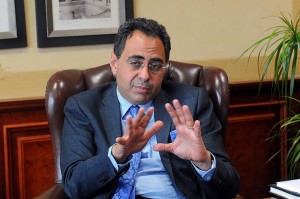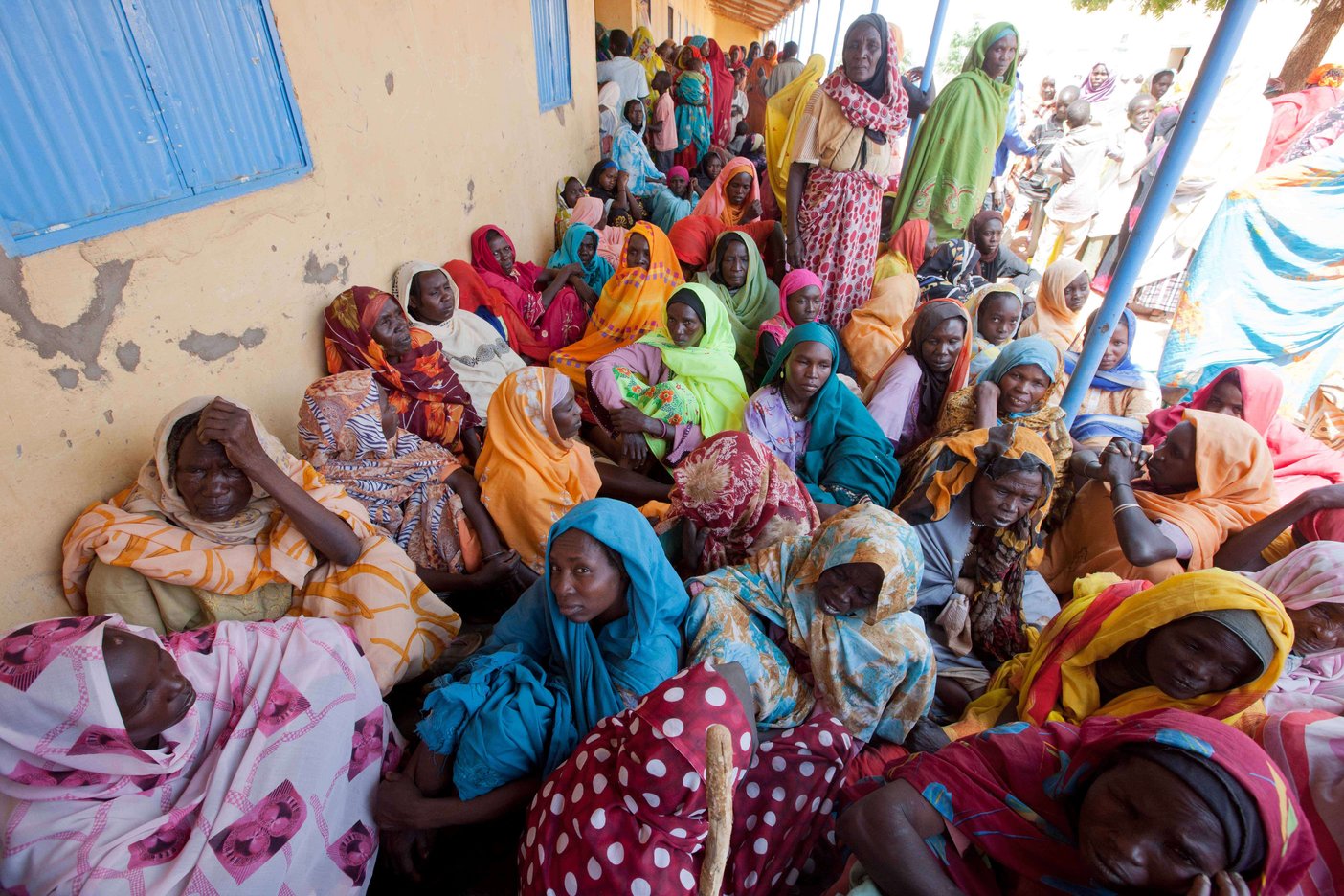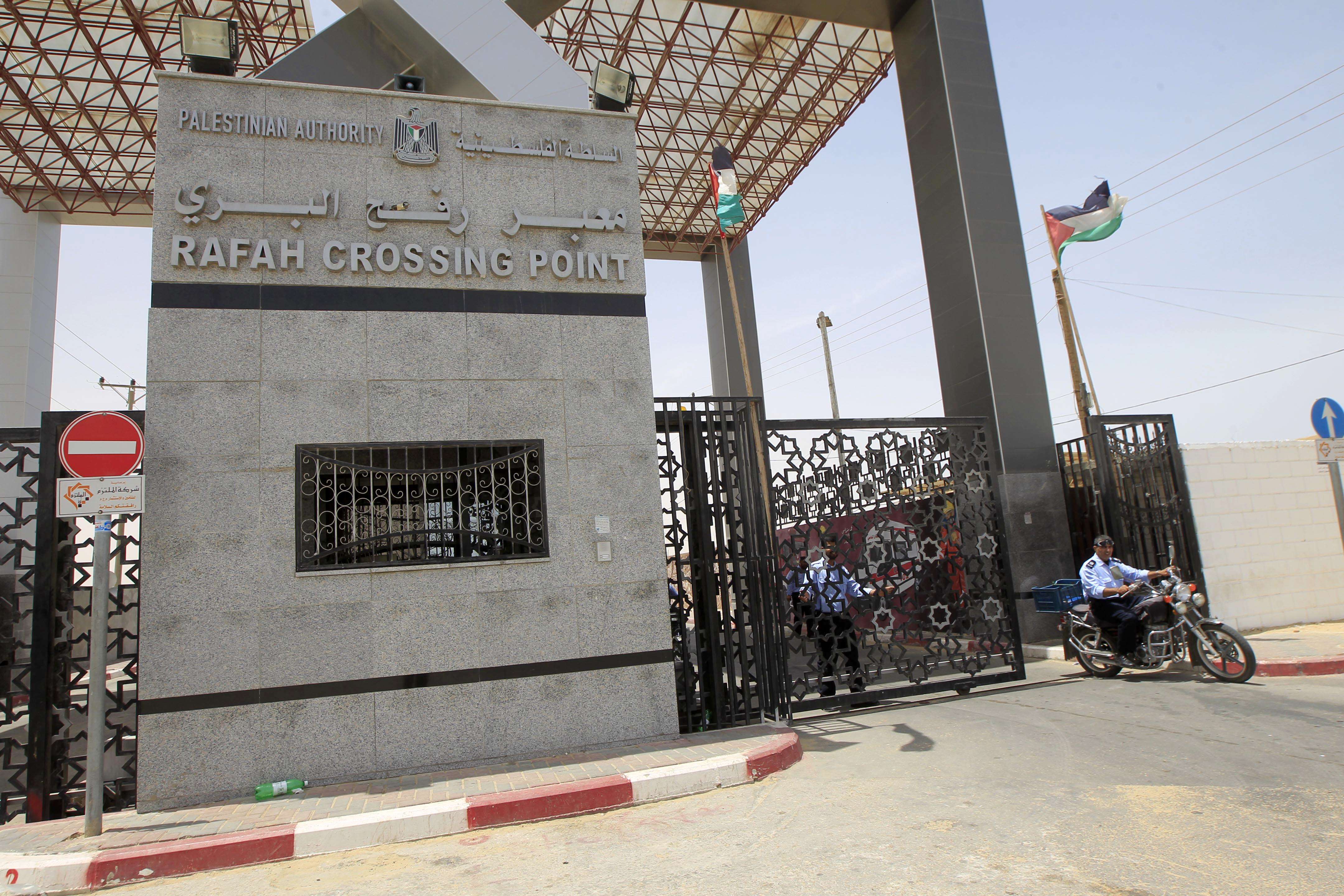By Mohamed Aiyad
Egypt has found itself at a critical crossroads. Consumed by political squabbling, we find ourselves as a country unable to engage in serious national dialogue.
Death and injury plague our streets two years after the outbreak of the revolution, with clashes and acts of violence between protesters and security forces taking place all over Egypt, leading to the death of our citizens and destruction of government facilities. All of this has put increased pressure on Egypt’s economy, and its ability, or inability to provide for its citizens.
Amidst all this, we have asked that Dr. Hani Sari el-Din analyse our current political state, discuss what is required to pass legislation, and identify what factors in particular have caused Egypt’s economy to disintegrate.

Mohamed Omar
The value of Sari al-Din’s input stems from his extensive legal experience. Before the revolution he was known for providing legal consultation to a number of local and international companies working in in the coutry.
Recently, he has served as a member of the Free Egyptians Party’s political office, however currently works as the President of the Dostour Party’s Economic Committee, one of the country’s most prominent opposition parties that founded the umbrella organization known as the National Salvation Front (NSF). He is also President of the Department of Business Law at the University of Cairo.
With regards to the Muslim Brotherhood (MB), according to Sari al-Din, they are at the moment an organization that is more concerned with securing the placement of officials loyal to them within state institutions, than they are with the well-being of the state itself.
Until now, we have not seen the rise of anyone within their ranks who is capable of stabilizing the country, or exerting the type of political will needed to realize the simplest dreams of the people. This includes a good education, the ability of recent graduates to find a place in Egypt’s job market, and above all, a clean cup of water and enough food to feed a family.
The Muslim Brotherhood
The MB has not only been in inefficient in governing, but also complicit in helping to administer our current crisis. The reasons for this are hidden in the organization’s structure, as it is not the President who rules Egypt, but rather the MB’s Guidance Office, which in reality, wields more power than president, his party, and the entire Egyptian state apparatus.
So far, most decisions implemented by the FJP have been agreed upon behind closed doors. This has weakened state institutions and their ability to affect change, and has led to confusion in both the halls of the Shura Council and the Egyptian street.
What Morsi must do is serve as a President for all Egyptians, however this is not merely an empty political statement. With the rapid deterioration of Egypt’s economy, we find ourselves in a race against time to quickly enact decisions that will foster political dialogue and national unity and help work towards the public good.
Unfortunately, the Brotherhood’s number one concern up until now has been to put its supporters in positions of power, based on the assumption that this will bring about stability, which will allow the government to then pursue reform.
They firmly believe in the process of al-Tamkin, or overcoming adversity, which in their mind has come to mean replacing the country’s old leadership with that of their own. Despite this, what we have seen is a system that has remained corrupt, and barely changed until now.
The Brotherhood first began its process of al-Tamkin during the first parliamentary elections, and continuing with the passing of the constitution, which as we know was not met with popular approval. What they seek now to do is push through the next round of parliamentary elections, and then turn to reform.
However in their pursuance al-Tamkin, the Brotherhood has trampled on Egypt’s judiciary and ignored the legitimate demands of the country’s various political parties.
Instead of providing solutions to the country’s economic problems and bringing about a clear policy of reform, this process has only helped to chip away at the confidence held by the people for their government. It appears that Hosni Mubarak and Muhammad Morsi have become two sides of the same coin.
What first must be done according to Sari al-Din, is postpone the country’s upcoming parliamentary elections, revamp the country’s election laws, and create a legal committee responsible for proposing and overseeing amendments to be made to Egypt’s constitution.
Despite Sari al-Din’s opposition to the president, he has also expressed his opposition to impeaching him, as there are as of now no plausible alternatives, and because such a decision may elicit a violent reaction from the MB and Egypt’s Salafis. He added that what is needed now is a strong opposition that can pressure the president into pursuing the country’s strategic interests.
National Salvation Government
Al-Din went on to say that he, and other members of the NSF, are currently working on the creation of a new economic program aimed at helping to get the country back on track. He would not go into detail however regarding the program, as it was still in the works.
That being said, what is required now is the establishment of a new temporary government to serve as an alternative to Qandil in order to address the country’s short term economic problems that gotten worse day after day. Every day that Egypt waits, more factories close, unemployment rises, more workers go on strike, and security continues to deteriorate.
This exacts a high social and political cost that prevents Egypt from exercising its role in the region and in the world, preventing it from pursuing its strategic interests. According to al-Din, one cannot rely on the ballot box to yield the best results. What must be done is to destroy the old regime in its entirety, not simply replace select individuals within it.
What Egypt needs now is a new national salvation government that will work to improve security and limit the clashes seen in our streets. He said this would be done by rebuilding Egypt’s security forces anew from the ground up. He acknowledged that although restructuring the Ministry of Interior could be expected to take up to five years, it was necessary to begin doing so now.
In the event of the creation of a national salvation government, President Morsi would be asked to cooperate and help to limit the influence of the Ministry of Interior in domestic politics. The government needs to re-establish the people’s trust in the state’s security forces. This requires that they be adequately equipped to go after both corruption in politics in addition to thugs on the street.
The idea to create a national salvation government was first created during a recent meeting held between Sari al-Din and Muhammad Mahsub, former State Minister for Legal Affairs and former Member of Parliament. Other ideas such as the creation of a permanent economic affairs committee tasked with revising legislation were also floated during the meeting, however died with the resignation of Mahsub from his position as State Minister.
The State of Egypt’s Economy and Investment
During the presidential campaign, Sarie Al-Din was offered the position of Industry and Commerce Minister in Ahmed Shafiq’s government, which he refused because he did not feel that the time was right. Despite rumors he was not however, offered the position of President of Egypt’s Central Auditing Agency.
He went on to criticize the country’s current economic ministers for focusing exclusively on long term development, while ignoring efforts at short term reform. It was necessary he said, to address the day to day struggles of average Egyptians, particularly those employed through tourism, which has ground to a halt since the outbreak of the revolution. Other issues, such as the closing down of factories and drying up of foreign currency reserves, have also been the focus of Sari al-Din’s criticism.
The latter in particular has had a devastating impact on the economy, with Egypt’s reserves losing half their value since the start of the revolution, putting pressure on local currency, which has led to mass inflation, and forced many Egyptians who rely on imports for food and fuel to descend into poverty.
He emphasized the need to provide a clear legal framework for investors to operate within, and do what is necessary to encourage the signing of long-term contracts. This he said, was necessary to combat the policy of what he referred to as “trembling hands”, which has led Egypt to lose large amounts of foreign investment because of political and economic instability.
Addressing these problems he said, would require real national dialogue, not merely in order to provide political cover for the government during negotiations with the IMF, but to prevent the all-out failure and destruction of the country’s national institutions.
He went on to say that the government should never intervene in the country’s civil, criminal and commercial courts, regardless of their orientation, and that it was ever important to preserve the independence of the judiciary. He pointed to information recently discovered by the Public Prosecutor that granted the government the right to move and transfer judges from one precinct to another for a period of up to one year. This he said, was an example of the violation of the concept of checks and balances.
The Need for Legislation
New laws needed to be passed he said to address these problems, pointing to his own experience working on legislation. During his time as President of the Capital Market Authority from 2005-2007 he proposed a number of laws related to securities and consumer protection. In 2003, he helped draft bank law 88, in addition to public-private sector cooperation legislation which materialized into law in 2009.
According to Sari al-Din, these laws were drafted after having consulted with all concerned parties and taken their interests into account. The worst thing a government could do he said, was “the executive branch taking it upon itself to force into law a piece of legislation that is not supported by those that it affects the most.”
Bank law 88 for example, was created after discussions were undertaken with members of Egypt’s Central Bank in addition to a number of smaller bank leaders. This law he said, particularly article 51 which discussed bank mergers and conflicts of interest, was discussed over a period of 5 days and ultimately helped insulate Egypt from the 2008 world economic crisis.
Between 2001 and 2003 Sari al-Din also provided economic and legal consultation to the economics committee of the National Democratic Party for a number of legislative laws. This included consumer protection, financial market, and competition protection laws.
When asked about policies related to market monopolies, he said that such a system was not bad in it of itself, but rather that specific practices undertaken became problematic when they went unregulated. He pointed to Microsoft as an example of a company that once behaved like a monopoly, but did not raise prices for consumers in a way that negatively affected the economy.
When discussing health care, Sari al-Din stated that before passing any new laws it would be necessary to pose a series of questions that identify what goals such a law is looking to accomplish. Will this law increase the number of people who are covered? Will health care services improve at a lower cost to the state? If these questions cannot be answered than such a law has no value.
The same mindset he said can be applied to tax laws. Will such a law increase the total number of government tax receipts? Will it improve the general business environment in Egypt and create new opportunities for investment? Or will it work to block the influx of foreign capital? Unfortunately he said, laws today have been passed haphazardly, by people who are not experts in their field, which once again has caused the Egyptian people to lose faith in their government.
Previous Precedents
The conversation turned to reviewing and discussing economic problems faced by previous governments before the outbreak of the revolution, particularly those of the Nazif government that in 2004 began to institute a program entitled “reaping the fruits of growth.” This program sought to implement economic and financial reform that would extend to the poorest sectors of Egyptian society by establishing a complementary service industry funded by national government initiatives.
The program failed he said, because it failed to tackle the need for serious institutional and bureaucratic reform. Less than 3% of Egypt’s population was expected to have benefitted from the program, while the country’s lower class actually grew larger. Those overseeing the project he said, had not been qualified, as the program’s board of advisors lacked university professors, judges, government employees and technicians.
Attempting to undergo such a program now he said, would not be appropriate, considering that the country’s middle class is to weak and its lower class to large. Government institutions also are not currently strong enough to adequately combat poverty or work to turn economic theory into reality.
He did point out that the country’s economic ministers working under the Nazif government had little political experience, which, in Sari al-Din’s mind, made them good candidates to work towards the kind of reform that the country’s politicians had so far not been able to accomplish.
This included Yousef Ghali as Finance Minister, Mahmud Mahya al-Din as Investment Minister and Rashid Muhammad Rashid as Commerce Minister. However again, the failure of these ministers to address the country’s problems was rooted in their inability to tackle the need for real institutional reform.
Contracts, Bonds and Monetary Policy
With regards to the stock market, many Egyptians according to Sari al-Din had reaped millions of pounds worth of profits before the revolution, not as a result of corruption, but rather because the amount of money being traded exceeded EGP 2bn per day. This however did not translate into benefits for the government or Egypt’s production sector.
Since the revolution, Sari al-Din has been working to settle a number of disputes related to investment contracts with Arab companies. The government is currently embroiled in 3 disputes with the Emirati company DAMAC regarding land in Jamsha on the Red Sea, Hyde Park in New Cairo, and Avenue land in the city of Shaykh Zuweid.
Disputes arose after the New Urban Communities Authority attempted to increase the value of DAMAC’s contract from EGP 140m to EGP 180m, as a fine for late payment of previous fees, a move DAMAC refused. Similar disputes have occurred with the Al-Futtaim, the Emirati real estate and construction company.
Sari al-Din has said that government officials working on contract disputes should be given impunity to conduct negotiations in order to quickly reach a settlement.
Regarding Hisham Ramez replacing Faruq al-Aqda as President of the Central Bank, Sari al-Din said that Ramez was a prominent expert who was qualified to set monetary policy. He added however that Ramez would need to move fast in order to balance Egypt’s exchange market and reduce inflation.
He added that recent government decisions against the sale of Egyptian companies to foreigners were bad and would chase off investment. Contracts he said needed to guarantee both the rights of the state and investors, and that decisions to unilaterally void contracts as opposed to terminating them with the consent of both parties, would hurt the government.
The problem, he said had to do with the inability of the government to pass laws regulating the transfer of ownership of companies from the public to private sector.
This would require that the government enlist the help of international arbiters, at a high cost to the state. That being said, Egypt also had a need to introduce laws aimed at reviving public sector companies. According to Sari al-Din, acceptance of Egypt’s pending $4.8bn IMF loan was inevitable, due to the sorry state of Egypt’s economy.
Morsi’s abrupt freezing of recently proposed tax amendments, just a day after their details had been distributed throughout Egyptian media, was a testament to the haphazard nature in which the President’s economic policy had been determined. He added that the freezing of these amendments was unconstitutional and illegal, saying that doing so would require that Parliament pass a law.
The details surrounding Islamic bonds were also unclear and needed to be reviewed. Using religion as a cover to impose unfair legislation he added, threatened the interests of the state. Many aspects of the Islamic bonds law were still unclear, however, personal ownership of state assets, he went on to say, was illegal and would be a line in the sand
Sari al-Din called on lawmakers to review similar debates surrounding bond laws in other countries, saying that Egypt was not, “the first country to reinvent the wheel.”
Translated by Jeremy Hodge




